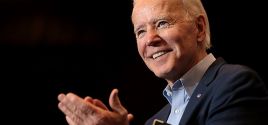Trickle Up EconomicsPeter SchiffJun. 26, 2012 |
Popular 
Biden Commutes Sentences of 37 of 40 Federal Death Row Inmates - Excludes Robert Bowers, Dylann Roof

'This is Cruelty, This is Not War': Pope Francis Condemns Gaza Genocide in Christmas Message

U.S. 'Shoots Down Own Jet' Over Red Sea in 'Friendly Fire Incident'

Ohio Senate Passes Bill Aimed at Outlawing Criticism of Israel, Criminalizing Gospel

Putin Accuses 'Ethnic Jews' of Tearing Russian Orthodox Church Apart
 The political left wing has long tried to cast doubt on the fairness, and even the efficacy, of free market capitalism by branding it as a “trickle down” system. This epithet is meant to show how the middle and lower classes are dependent on scraps of wealth that happen to fall from the buffet table of the rich. This characterization of an unfair and inefficient system has helped them demonize policies that lower taxes (if they also extend to the wealthy) and reduce regulation on business. To correct these supposed problems, they have long called for policies to redistribute wealth or for government to inject funds directly into the economy. Either mechanism puts money into the hands of everyday consumers who they claim to be the true engines of economic growth. They believe that consumer spending lies at the root of the economic pyramid. When people spend,business owners are able to sell more products, hire more workers, and reap more profits. In essence,they believe in a system of “trickle up” economics, whereby prosperity flows upward from government into the lower and middle classes and ultimately to the upper class. Conversely, they argue, if consumers aren’t buying, business sales decline and workers lose jobs. The jobless spend less than the employed, putting even more pressure on businesses. This leads into a vicious cycle of falling sales and increased unemployment. They believe that if a shock is not applied to reverse the cycle it is possible for an economy to regress, in theory, right back to the Stone Age. Using such logic, it is easy to identify the foundation upon which the economy rests: it’s the spending, stupid. Some progressives have likened this process to a natural ecosystem wherein government spending is the rain that makes grass grow. The grass attracts zebras and antelopes (consumers), which then offer sustenance to the lions (capitalists). If this is your diagnosis, then your prescription should be patently obvious: restore the demand lost through unemployment and get people spending again. How to accomplish this is also equally simple: take the money from the rich who really aren’t using it anyway. Without entering into a parallel discussion of fairness, demand side economists simply see the redistribution of money from the rich as a way to generate economic growth, which benefits society as a whole. As they see it, the rich have more money than they need to satisfy their own personal demand. No matter how rich, a single individual can only eat in so many restaurants, buy so many cars, or go see so many movies. The money they don’t spend is saved instead, thereby sucking needed demand out of the economy. In contrast, the lower and middle classes spend a much higher percentage of their net worth. To break the vicious cycle,all that is needed is to direct these idle funds where it will be spent rather than saved. In a June 19th Wall Street Journal cover story, reporter Jon Hilsenrath underscores this point in explaining why the impact of the Fed’s low interest rate policies are being weakened by the current preference for high credit score borrowers. Says Hilsenrath, “Financially secure households are less likely than lower-income households to spend their interest rate savings. Wealthier households are more likely to save or invest.” A policy prescription such as this is seductive. It allows people to advocate a moral position (it’s a shame that the poor don’t have as much as the rich) in purely practical terms (redistribution creates economic growth). And if spending is the panacea, then government can easily wipe out suffering, even if they lack the political ability to raise taxes. After all, what stops them from printing all the money needed for people to spend the economy back to health? According to Nobel Prize-winning economist Paul Krugman, only the political cynicism of Republicans, who try to wring votes out of Americans’ misplaced hopes for upward mobility and their stubborn fixation on thrift, prevents this painless and readily available cure. But as usual, they have it exactly backwards. The savings that they find so unproductive is actually the foundation upon which the economy rests. Nothing can be consumed until it is produced. The act of spending is meaningless without something to buy. The savings of the rich forms the capital that funds business investment which increases productivity. The more that society produces, the more that can be consumed. The key here is the supply, not the demand. The grass that feeds the zebras comes from seeds, not rain. Capitalists provide the surplus seeds that are planted. Demand always exists and does not need to be stimulated by cash redistribution. 21st century Americans are no more desirous of cell phones than their parents were. But in 1980 cell phones were in very limited supply and were therefore very expensive. They were the trophy possessions of the super-rich. The reason why they are now as ubiquitous as key chains is not that government stimulated demand, but that industry figured out how to supply them far more efficiently. The supply satisfied the demand. Investment in the telecom sector, which came from real savings of Americans, allowed for that increased productivity. In this example, the savings of the wealthy and the innovation of entrepreneurs combined to create a huge benefit for society. Call it trickle down if you want, but it would be more honest to simply call it effective. This is the system that built this country. Relying on trickle up will surely destroy it. |



